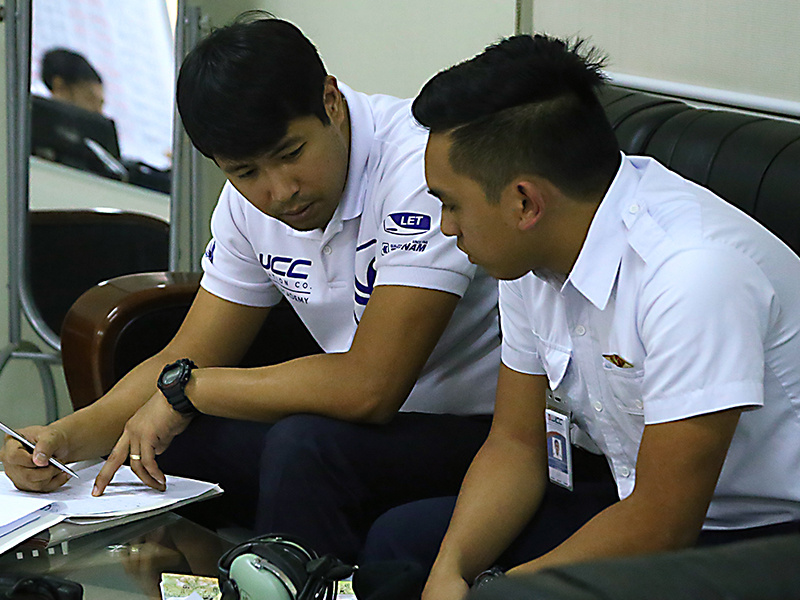


Perhaps you are one of those who are fresh out of high school and who’s about to enter aviation school. Or maybe you’re already a college graduate, or even a professional, who’s also enrolling in flying school after finally saving enough funds to undergo flight training.
Either way, congratulations! You are moving one step closer to your dream of becoming a commercial airline pilot.
Luckily for you, you live in the Philippines. A country that has a solid reputation of having some of the best aviation schools not just in Asia, but in the world.
Still, choosing the best school for you requires a bit more homework. Enrolling in aviation school is considered a long term investment and like any investment, you need to conduct due diligence to make sure that the training you get takes you on the right path in attaining the career you’ve always wanted.
You cannot just Google your way into determining which school is best for you. Mere referrals from friends and relatives are also not enough. You need to visit your prospective aviation school and ask the right set of questions to make sure that you will get the most out of the education you or your parents will be paying for.
Here are some questions you may need to ask when inquiring for aviation school. The answers you get will come in handy in making the final decision which school to go to.
1. How is the school’s reputation?
First thing to ask is how long the school has been offering flight training. It’s also important to know their teaching staff. Are they licensed instructors? Also get the list of the school’s credentials and research later on how credible these citations are.
2. What is the school’s setup for flight training?
Ask about the kinds of aircraft that the school uses to train students. It’s important that you know that the aircraft that they have will eventually help you fly in-demand aircraft such as the Airbus A320. You may also want to know if progressive flight checks are given to help evaluate your progress during the flight training program. It’s also a good idea to be guided on the instructor-to-student ratio. Ideally, you would want to have a one-instructor-to-five-students ratio to make sure that you are getting the full training you need for flight.
It’s also worth knowing if the school has its own airfield, just like how WCC Pilot Academy operates a private airfield in Binalonan, Pangasinan. This is very crucial for safety. Try to stay away from schools which share government-owned airfields, similar to the one in Plaridel, Bulacan.
Pick also the school which invest in internationally-rated simulators. Avoid schools whose simulators are merely desktop-based as these are not really known for safe and quality flight training.
3. How is the aviation ground school?
A huge chunk of your aviation education takes place on the ground, so we cannot overstate the importance of how the school goes about its ways and means to teach how, where, and when to fly safely. Try to sit in during one of their classes and get a feel of how classroom sessions go. Check also their library or resource center. Do they have a good collection of books, videos, and other reference materials? Another very important matter to notice is the facilities. Are they equipped with the latest instrument training tools and flight simulators?
4. Can I check the training airplane?
People often make a fuss on whether the training aircraft to be used is high wing or low wing. Honestly, it doesn’t matter much. What you really want to know is that the airplane is well-maintained. Avoid schools that rent airplanes as this may result in scheduling problems later on. Consider schools with a fleet of primary, advanced, and multiengine airplanes as a big plus.
5. What are the school’s safety regulations?
What are the procedures that the school takes to ensure safety during flight training? Do they have liability and collision insurance policies? Are you covered as a student pilot? Go as far as to inquire about the services that are available at its airport, including instrument approaches and control towers. A big part of flying is safety and you need to be apprised of these things before committing to enrol in an aviation school.
6. Can I ask more questions?
A lot of the things you’ll eventually appreciate or regret in an aviation school rely on the not so obvious question you can ask today. Don’t be afraid to throw in a lot of questions. For instance, ask who keeps your record of flights because poor documentation may cause students to repeat their training. Also, know what happens when weather or maintenance problems result in the cancelation of a flying lesson. Who’s responsible for re-scheduling? Ask if the license after the training is guaranteed, so you won’t have to unnecessarily pay extra for something you thought you already paid for.
Read the fine print of the brochures carefully. Interview other students to know more about the pros and cons of enrolling there. Lastly, get a vibe of the school’s culture. You will be spending a lot of time and money for your flight lessons so you’d want to be in a place that not only makes school fun but also drives you to make the most out of your education.
The information contained in this website is for general information purposes only.
While WCC Aviation Company endeavors to keep the information up to date and correct, we make no representations or warranties of any kind, express or implied, about the completeness, accuracy, reliability, suitability or availability with respect to information published in this website.
Click here to read the Privacy Statement in full